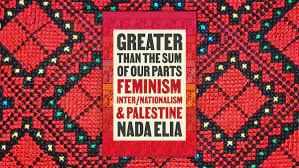Mary McGregor reviews Greater Than the Sum of Our Parts: Feminism, Inter/Nationalism, and Palestine by Nada Elia. This has also been posted by bella caledonia.
GREATER THAN THE SUM OF OUR PARTS, FEMINISM, INTER/NATIONALISM AND PALESTINE
True liberation only comes when oppressed groups rise together in solidarity and recognize the interconnectivity of our struggles. At demonstrations throughout Scotland and the rest of our Disunited Kingdom, we increasingly hear cries to Unite the Struggles. And so, we see Queers for Independence contingents on Pride marches, Palestinian flags on independence marches, and Internationalist speeches against oppression throughout the world at Mayday demonstrations.
There is growing reassertion of the importance of the links – historical and current- between people across the globe fighting for their rights and freedom in an increasingly reactionary milieu where there is a sense of regression rather than progress.
Nada Elia is a member of the Palestinian diaspora, a professor at Western Washington University and a member of the Palestinian feminist Collective. What Nada Elia does in this prescient book, is look specifically and forensically at the connection between the struggle for self-determination of Palestinian, Black, Indigenous, feminist, working class and queer communities within the larger anti-colonial, anti-capitalist and anti-racist context. She says the experience of the Palestinians is “the experience of the dispossessed and disenfranchised everywhere”. The colonial violence of Israel and the apartheid structures it creates to support its colonial expansionism, is placed firmly as the legacy of European colonialism over hundreds of years.
It is a book which demands action and is therefore a book of hope and purpose. The kernel of this perspective is encapsulated in the Appendix Pledge – Palestine is a Feminist Issue which highlights the need for us all to “confront the structural forms of gendered and sexual violence inherent to settler/colonialism, imperialist wars, racial capitalism and global white supremacy.” She identifies clearly the roots of oppression in global capitalism and US Imperialism and strives for a “global intifada” to create a world free from all forms of oppression.
Although written by an academic and thoroughly researched, her style and clarity of exposition makes it an accessible read for anyone and her assertion that Zionist colonialism cannot be reformed and requires to be dismantled is compelling. The Zionist /Apartheid state is irreformable and far from being a recent aberration within a previously, fundamentally, democratic society, it has, in fact been a racist state since its inception. The correlations between the worldwide fight against apartheid south Africa and the oppression of Palestinians, is useful in bringing on board new sections of activists many of whom also feel “othered” and discriminated against.
She sandwiches eviscerating chapters where she demolishes the western narrative between two visionary chapters illuminating the power and necessity of intersectional activism.
However, while it is possible to see similarities between various forms of oppression, I think there is a danger in asserting that it is the same for each group. We may be able to draw parallels between life experiences of indigenous people of Turtle Island (the name used by Elia for north America when she is discussing Indigenous matters) and Palestinians. However, the oppression they experience on a day-to-day basis is different. Jeanine Hourani highlights this and what she sees as “missed opportunities” in Elia’s work in Red Pepper April 2023. While critical of some of the parallels that Elia draws, Hourani does recognise the usefulness of Elia’s approach in contextualising the Palestinian struggle globally. While there are inevitably differences between all liberation struggles, this does not negate the imperative for those struggles to organise together, build solidarity and fight the common enemy.
Like Hourani, I too was pleased to see grassroot organisations cited by Elia which are building solidarity but would like to have known more of how these groups work together on a practical level demonstrating their solidarity and resistance.
Elia’s book does much to dismiss the myth of a Zionist state which embraces and enhances the rights of women and LGBTQ+ groups. The “red washing” and “pink washing” of Brand Israel is being called out for the façade it is. In the appendix, there is an out and out rejection of “all appropriations of feminist and queer rights discourses that, are used to dehumanise Palestinians , justifying on going settler colonisation of their homeland and repress their political activism”. She highlights the way Palestinian women and LGBTQ+ communities are targeted and treated by the Israelis in a brutal, and violent, manner. She illustrates with frightening clarity that Israel does not promote liberation in any sense. It is about the systematic murder of Palestinians: men, women, queers and children. The Zionist settler colonial project is genocidal.
I think this book makes an important contribution to the Palestinian fight for self-determination. It recognises that integral to the struggle for a Free Palestine is the struggle for equality for all. It also challenges us in the west to free ourselves from orientalist tropes and explore how we can unite in solidarity with our sisters and brothers globally for emancipation, liberation and self-determination.
21.8.23
____________
also see:
Mary McGregor – Nablus, mountain of fire, centre of nee Palestinian resistance

